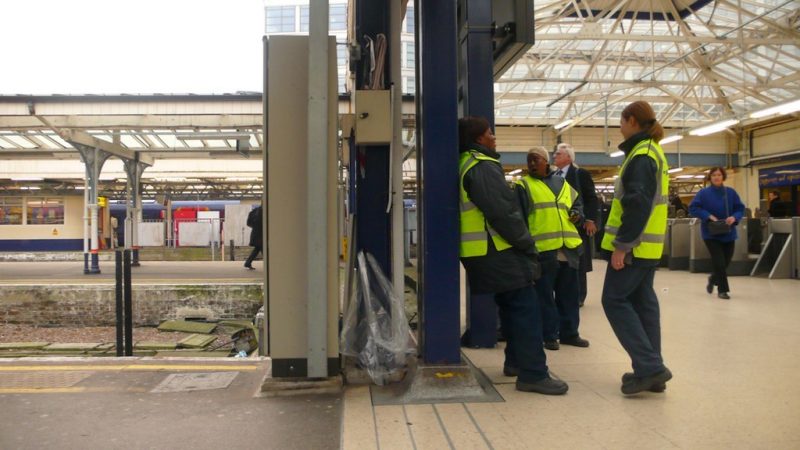'Outsourcing means employers can avoid their responsibility to us as railway workers.'

Train cleaners set the ball rolling last year as the first RMT members to take strike action ahead of a summer of discontent on the rail lines.
For outsourced train cleaners, the fight continues, as they prepare for a 48-hour strike this weekend across the country.
Their demands include conditions we may take for granted, like company sick pay, access to annual leave, a good pension from their contractors and earnings above the minimum wage to bring their pay up to £15 an hour.
This would mean some staff wouldn’t have to be homeless, sleeping at bus stops whilst working six day weeks or living in a one-bed studio with their children.
Bella Fashola, RMT National President for Organising Transport Cleaning Workers, recounted these living conditions she heard from members and asked how it can be possible in this country?
“It’s just outrageous that you can work five, six days a week to have to live like that,” Fashola, a train cleaner for six and a half years, said.
According to RMT, over a quarter of rail cleaners report skipping meals, 1 in 3 are relying on credit cards to pay for the cost of living and 84% are struggling to make ends meet.
Fashola highlighted some of the effects outsourcing labour has had on work conditions, such as only having access to statuary sick pay which has resulted in staff either forcing themselves back to work or having to use their annual leave.
“We’ve got over 40 different nationalities on my contract that we’ve worked out, so most of my colleagues want to use their annual leave to go back home and see their family and sometimes their own children.
“They’re not able to do this if they have to keep using their annual leave when they’re sick because they can’t afford to take a day off.
“They’re also putting themselves and the public at risk when they have to force themselves into work sick.”
Outsourced cleaners are also separated from their in-house colleagues with separate work rest rooms, which Fashola compared to ‘a prison in Saudi Arabia’.
She said the break spaces for outsourced workers were usually old store cupboards, lacking basic necessities, some with manholes and bars sticking out of the walls.
“When I visited a site last month, me and my regional organizer bought them some water, and they were so happy to have water.
“I think that’s absolutely disgusting. It’s the basic things they must supply you with in the workplace.”
The rail cleaners are also asking that their employers provide work travel compensation, something Fashola said would cost the Department for Transport nothing, but would be ‘life changing’ for the workers.
Effects of privatisation
Before privatisation, employers of a rail company had opportunities to progress their career within the sector through internal roles, from a cleaner to a ticket inspector for example.
But outsourcing has made this impossible.
“You’re stuck in a downward spiral of debt,” Fashola said. “You think that you’re going to join the railway to be a train cleaner in the hopes of getting a job as a supervisor or a train driver perhaps. But that’s not the case anymore.
“Outsourcing cut that off in the middle to take the profit.
“Before there’d be opportunities as you’d be able to apply for internal roles because you’d be in-house. But now jobs are snapped up so quickly that you don’t even stand a chance if you apply externally.”
She added: “When you’re outsourced, you’re kind of outside the box of the railway, like you’re not railway staff.
“But we are railway staff. We work on the railway every single day.
“Outsourcing means employers can avoid their responsibility to us as railway workers.”
Initially the strikes were a smaller movement of contracted staff from the same private company, whilst now it’s grown into a national cleaner’s campaign.
Fashola’s final message was to urge the government to end privatisation.
“We can never have economic growth if we’re constantly outsourcing everything that we have in this country.
“A lot of my colleagues feel like we are essentially modern day slaves, the way that we have to work and the conditions we have to work in, the pay side of it, the debt side of it, it just feels like you’re forever trapped and you can’t get out.
“The only way that we can get out would be through ending the privatization and bringing us all back in-house.”
She said that cleaners will not give up even after over a year of strike action, because they have no choice.
“We’ve been pushed so far below living means that we have no other alternative.”
Hannah Davenport is trade union reporter at Left Foot Forward
(Photo credit: Flickr / Creative Commons)
Left Foot Forward’s trade union reporting is supported by the Barry Amiel and Norman Melburn Trust

To reach hundreds of thousands of new readers we need to grow our donor base substantially.
That's why in 2024, we are seeking to generate 150 additional regular donors to support Left Foot Forward's work.
We still need another 117 people to donate to hit the target. You can help. Donate today.



